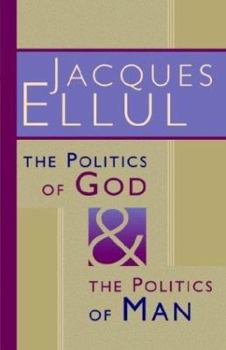The Politics of God and the Politics of Man
Select Format
Select Condition 
Book Overview
Man's freedom--God's omnipotence: how can they be reconciled? That question is central to this penetrating study of political action and the prophetic function. Ellul's answer to that question, though... This description may be from another edition of this product.
Format:Paperback
Language:English
ISBN:0802814425
ISBN13:9780802814425
Release Date:January 1972
Publisher:William B. Eerdmans Publishing Company
Length:199 Pages
Weight:0.60 lbs.
Dimensions:0.5" x 5.6" x 8.4"
Customer Reviews
2 ratings
The Still, Small Voice-I Kings 19:12
Published by Thriftbooks.com User , 17 years ago
I absolutely adore this. In my opinion, Ellul soars when he simply immerses himself in the biblical text as he did in The Meaning of the City, analyzing and commenting therefrom. In this book, he takes 7 worldly characters from Second Kings, and comments on how their reactions conformed to the world view or not, and how G-d interacted with them. The seven characters are Joram, Hazael, Jehu, the murderer of Jezebel and the house of Ahab, Naaman, the Syrian, Ahaz, King of Judah, King Hezekiah, his son, and the Assyrian Rabshakeh. Why does the Almighty, All Powerful G-d, choose humble means to get people's attention, a still, small voice talking to Elijah, the only remaining prophet of Israel, and lepers to bring the news of Syria's defeat to the King of Israel. His ways are clearly not man's ways in the book of Second Kings. The greatest contrast among these characters is that of the Assyrian Rabshakeh and King Hezekiah, in the last two chapters of the book. The Assyrian taunts the living G-d, declaring Him no G-d at all and threatens annihilation. Hezekiah prays to G-d, addressing Him as creator of all living, Melech Ha-Olam, King of the Universe, begs G-d to save them so that all the world would know the One, true and living G-d. G-d answers Hezekiah's prayer, not spectacularly, but soundly. The Assyrians are threatened with rebellion from Ethiopia, and the Assyrian king returns to his own land where his sons conspire to kill him in his temple of false gods. Ellul calls this book a meditation, and that it is. These stories will stay with you a good, long while. I'm so glad I have this in my possession.
Especially relevant in today's political climate
Published by Thriftbooks.com User , 20 years ago
The book of Second Kings may not be everyone's top choice for critical analysis or for a prolonged meditation on the relation between faith and politics, but Ellul beautifully accomplishes both. Looking at the major figures of the Hebrew chronicle, Ellul discusses their actions and effectiveness, noting the different ways that political leaders listen to and/or ignore the commands of God. He forcefully argues that to be faithful to God is to be politically impotent, and that even those kings who do God's will do not always do it according to God's ways. Given the current ties between conservative politics and conservative Christianity, these two points alone are worth exploring for their implications.





